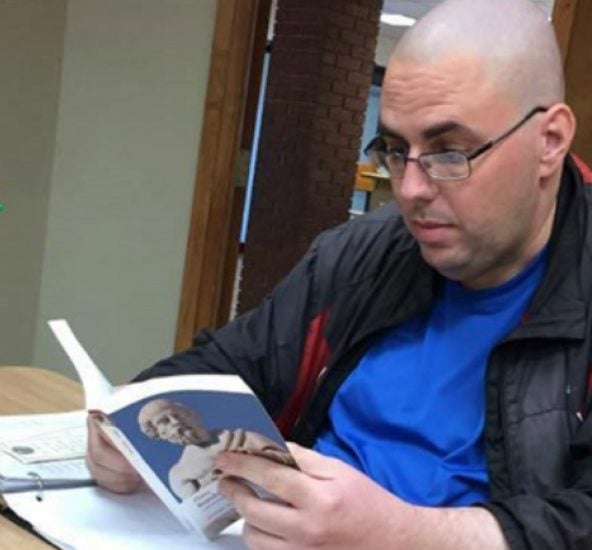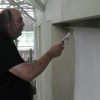KJIPUKTUK (Halifax) – Halifax Humanities is a registered charity “dedicated to enriching the lives of those living in material poverty, through education in the Humanities.” Its core program, Halifax Humanities 101, provides free and accessible classes to underprivileged community members.
Posted below is a speech Tim Blades, one of this year’s Halifax Humanities students and a frequent Nova Scotia Advocate contributor, gave to students of the Atlantic School of Theology. He was accompanied by Mary Lu Redden, the current program director, and Aron Spidle, a fellow student.
My name is Tim Blades. I am 38 years old, and I am currently a student in the Halifax Humanities 101 class.

Since 2015, I’ve been writing about poverty and welfare in Nova Scotia. Sometimes I will post an observation or story on my Facebook page or my blog. Some of my articles were published on the Nova Scotia Advocate. This speech will also be posted there.
The Nova Scotia Advocate also publishes a series called Lives on Welfare, where people tell their stories anonymously. Two of those stories are about my life, my name in that series is “John.”
There are plenty of stories about poverty in Nova Scotia. Stories of education being financially unattainable because of cost, lack of childcare or transportation money. Currently Community Services won’t provide funds for transportation to welfare clients unless it is medically necessary. This often leads to social isolation.
Lately, I have had people ask me about Halifax Humanities. I could merely describe how great it is to have a class where the books are free (to keep), transportation is paid for, child care is subsidized. Those poverty issues that I’ve already mentioned? Halifax Humanities takes care of them all.
It makes a University-level education, taught by professors, literature, fine art, and theatre, accessible to those with a limited income. I don’t speak much in class, but what I get goes far beyond monetary value or a curriculum.
The true value of Halifax Humanities can be traced back to two notions: poverty and people.
Poverty often exists alongside other issues. Those who live in poverty are often afflicted with physical or mental health issues, including depression and addiction. Single parents struggle in many ways.
So when you unite a group of people based on their financial reality, you also unite people who struggle in other ways.
The person struggling with addiction? They’ve found a friend who has endured similar experiences, a new source of support who is also looking to better themselves.
That guy who who has suffered with anxiety and depression (that would be me)? Well, he’s found several people that struggle in a similar way.
The single mom? She’s met someone who has already raised children as a single parent. She has gained a new source of emotional support.
Friendships are formed. Bonds are formed. Halifax Humanities takes people who might be socially isolated, and brings them together. Halifax Humanities, with its policy of accessibility and inclusion makes it all possible.
While certain policies or personal issues might tell someone to “stay home!”, Halifax Humanities tells those same people “to come be a part of something”.
Thank you.
After our speeches, Atlantic School of Theology students were given the chance to ask questions.
One question was if there were any themes or ideas in the literature that lit a fire in us.
Yes! Emphatically yes! The concept that has stood out the most to me is from Plato’s Republic, and it is the concept of “the appearance/reputation of morality vs actual morality”, the idea that not all claims to be doing the right thing are genuine.
I see that notion all the time, especially when it comes to the Nova Scotia Department of Community Services. (When I said that there was a gale of knowing laughter.)
I used special needs allowances as my example. Community Services may claim “We offer special needs allowances for diabetes and other reasons”.
They do. But what Community Services would not say is that shelter allowances are inadequate. In order to pay the rent people on welfare may well have to dip into her special needs allowance.
I was also asked about the role of literature (such as Plato’s Republic, my favorite book that we have read, thus far) in my everyday life.
My answer was that while I don’t discuss these works much with friends who aren’t in the class, the literature has had a profound effect on my life.
Our class is a group of caring, compassionate people. Some of us have similar life experiences. We help each other gain a better understanding of the literature we are reading and the artwork we are seeing.
The help doesn’t end there. I have been a listening ear to my classmates, and those classmates have done the same for me. I have been able to offer help to classmates, and I have received help from them.
I am a member of the Benefits Reform Action Group (or BRAG). I have several classmates who are interested in joining BRAG. Halifax Humanities is a venue where people can become empowered by empowering one another, which can make great things happen.
Thanks to Alex Rose and Dal Gazette for the use of their photo, which was a perfect fit for this story (I am reading Plato’s Republic). See: Halifax Humanities Searches for new director.
Click here to make a donation to Halifax Humanities.
Updated to correct misspelled names of both Mary Lu Redden and Aron Spidle. Sorry!
Please support the Nova Scotia Advocate so that it can continue to cover issues such as poverty, racism, exclusion, workers’ rights and the environment in Nova Scotia.




Is there any outreach to rural areas in Nova Scotia?
I am a summer resident in SW Nova Scotia — I bet there would be people interested in participating!